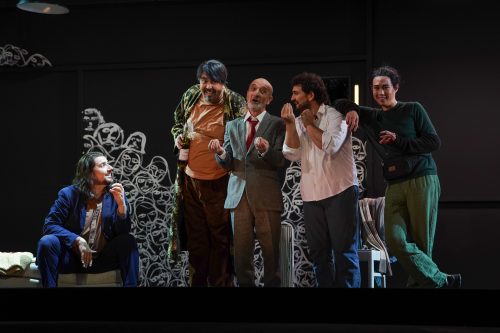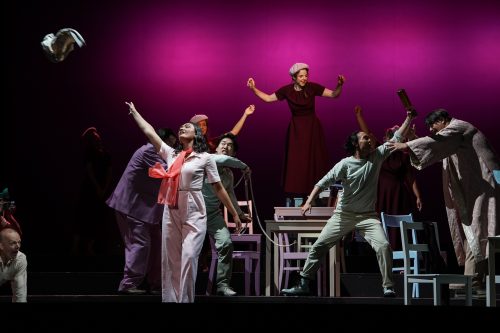Germany Puccini, La bohème: Soloists, Chorus and Children’s Chorus of Kiel Opera, Kiel Philharmonic Orchestra / Benjamin Reiners (conductor). Kiel Opera House, 4.2.2024. (DMD)

Production:
Director – Alexandra Liedtke
Set – Philip Rubner
Costumes – Johanna Lakner
Choreography – Paul Blackman
Dramaturgy – Eva Bunzel, Ulrich Frey
Chorus director – Gerald Krammer
Cast
Mimì – Caterina Marchesini
Rodolfo – Yenish Ysmanov
Musetta – Xenia Cumento
Marcello – Samuel Chan
Schaunard – Matteo Maria Ferretti
Colline – Oleksandr Kharlamov
Benoît – Andrzej Bernagiewicz
Alcindoro – Junggeun Choi
Parpignol – Lukas Caffier
Sergeant – Ill Hoon Cho
Customs Officer – Hankyul Lee
The lights go down in the auditorium and the audience stops murmuring; everyone is waiting for the conductor to arrive. Then comes the dreaded moment when a member of the theatre management appears at the side of the stage or from behind the curtain, attracting a spotlight, microphone in hand, to announce that a singer is in poor health but will sing all the same, or that a last-minute replacement has been found for a singer scheduled to appear but unable to do so. For this performance of La bohème, both Mimì and Rodolfo were sung by such replacements – Caterina Marchesini and Yenish Ysmanov, (Marchesini had even flown in that very morning). They were both a good fit for this production, which has been in the opera’s repertory since September 2023.
Set designer Philip Rubner has created a functional, contemporary environment: the artists live in a sparse loft. Marcello paints Musetta’s face stick-figure style onto the back wall, dozens of times in the first scene, probably hundreds of times by the last scene. The bed is a set of mattresses with sheet, pillow and duvet. The second act in the café took place in Mimì’s imagination – she is part observer and part participant to the events. In this scene, the lighting design by Matthias Hillebrandt was particularly impressive. The opera chorus and the children’s chorus, led by Gerald Krammer and choreographed by Paul Blackman, brought the dreamy nature of the scene to the fore. The crowds undulated in sync with the music: it is a pleasant and pleasing dream, comforting and joyful and by no means a nightmare. As it begins, the bed on which Mimì was resting at the end of Act I, is carried off the stage by some of the chorus members, and at the end of the scene and the dream, the bed is carried back onto the stage with Mimì still resting comfortably on it.

The outdoor area of the third act was indicated by four upright birch trees and one that has broken about one metre from the ground. A black curtain was constructed to allow specific sections to open and close or shift the frame of what was visible on the stage. Alexandra Liedtke’s production, supported by dramaturgs Eva Bunzel and Ulrich Frey, was convincing and entertaining. In addition, they rendered it philosophical with observations and reflections on death and dying, possibly representing, or at least relating to Mimì. This material was transmitted through the opera’s sound system, whispered by a female voice at striking moments throughout the opera, for which the music unexpectedly stopped on occasion.
Marchesini (Mimì) is a singer to watch out for. She is only 26 years old and has already accumulated a notable list of roles, performances and competition prizes. Her voice was rich and full, unforced, floating, blooming. Her piano was delicate, her forte thrilling. She captured the essence of emotions movingly and without exaggeration. And she is a good actor to boot. Yenish Ysmanov has been working in Germany since 2018, with Rodolfo in La bohème as his debut role. His repertory includes Don José (Carmen), Alfredo (La traviata) and Pinkerton (Madama Butterfly). An excellent actor, his voice was strong and fresh. He joined in well with the other singers in the ensemble flat-share scenes and expanded appropriately in his arias and duets with Mimì. ‘Che gelida manina’ was sung with many subtle nuances and rose effortlessly to an impressive and long-sustained high C. In their duets, Marchesini and Ysmanov created strong harmony. I have not heard the singers they replaced on this occasion, but no matter how they compare to the original cast their achievement was outstanding.
Xenia Cumento was lively in acting and voice as Musetta, equalled by Samuel Chan as Marcello. Matteo Maria Ferretti and Oleksandr Kharlamov as Schaunard and Colline made the most of the smaller roles Puccini wrote for their characters. Under the baton of Benjamin Reiners, Kiel Opera’s General Music Director, Puccini’s score came to life in many nuances of pace and volume. He took great care to observe and align with the needs of the singers, in particular the newcomers to the production, Marchesini and Ysmanov.
Daniel Meyer-Dinkgräfe